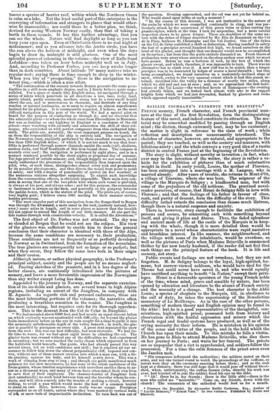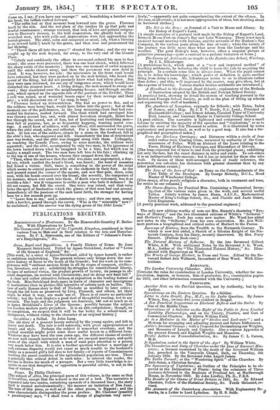'BAILLIE COCHRANE'S FLORENCE THE BEAUTIFUL. * FRENCH scenery, French character, and
French provincial man- ners at the time of the first Revolution, form the distinguishing feature of this novel, and indeed constitute its attraction. The ma- terial may be somewhat modified by passing through an English mind ; the diction, though extremely neat, may be too exuberant ; the matter is slight in reference to the class of work ; while reflection and description are unnecessarily introduced. The sketches of character, however, are natural, and appropriate to the period ; they are touched, as well as the scenery and manners, with felicitous nicety ; and the whole conveys a very good idea of a rustic district in central France just at the beginning of the Revolution. The story is slight, without novelty or invention ; in fact, what- ever may be the intention of the writer, the story is rather a ve- hicle for the exhibition of pictures than of much substantive weight in itself. In early youth, Louise, the mother of Florence, has been entrapped into a marriage with a M. Langeao, who is married already. After years of trouble, she returns to Mont d'Or, a village of Touraine, where she was born. The seigneur of the village is the Marquis de Soligny ; a kindhearted man, but with some of the prejudices of the old noblesse. The practised novel- reader perceives of course, that Henri de Soligny falls in love with Florence; • and that the feelings of his father in favour of class, rank, and purity of descent, form the difficulty of the story. This difficulty rather retards the conclusion than causes much distress, though there is a natural suspense and anxiety.
There is, however, story enough to facilitate the exhibition of persons and scenes, by connecting each with something beyond itself, and giving it place and fitness. Thus, the faded splendour and ancient mode of life at the castle of the Marquis is in keep- ing with the whole, though it is more detailed than would be appropriate in a novel whose characteristics were rapid narrative and breathless interest. In like manner, the neighbourhood, and the village with some of its inhabitants, would be overdone, as well as the pictures of Paris when Madame Brinville is summoned thither by her now lonely husband, if the reader did not feel that such things are the principal feature of the book. It is life and scenery, not story.
Public events and feelings are not overdone, but they are not forgotten. M. de Soligny belongs to the loyal, high-spirited, hu- mane, but narrow-viewed noblesse,, who would have died for the Throne but could never have saved it, and who would equally have sacrificed anything to benefit " la Nation," except their privi- leges. Henri is a favourable specimen of the young French noble of the time, whose mind, grave and sensible by nature, has been opened by education and literature to the abuses of French society and the necessity of a change. The best character is the Abbe Louis; a species of chaplain to the Marquis, till, in obedience to the call of duty, he takes the superiorship of the Benedictine monastery of La Meilleraye. As in the case of the other persons, something of modern theory and English opinion may be found in the Abbe: but he is a good representative of the thoughtful, con- scientious, high-spirited priest, possessed both from history and observation with the fearful oppression and. misery which the French regal and feudal systems have produced, as well as of the crying necessity for their reform. He is mistaken in his opinion of the sense and virtue of the people, and in the hold which the Church has upon their minds. To this mistake he falls a victim. He has gone to Blois to attend Madame Brinville, who dies there on her journey to Paris; and waits for her funeral. The priests are so unpopular that a riot is apprehended, and soldiers follow the procession. For a time the calm firmness of the priest awes even
the jacobin mob.
"His composure influenced the authorities; the soldiers rested on their arms, and not one turned round to watch the proceedings of the ruffians, so intent were they on the ceremony enacting before them ; and as the mob kept at a distance, there was still hope that it would pass off without blood- shed, when, unfortunately, the ruffian Sanson (who, directly his work was over, had hurried off to join the rabble) fixed his eye on the abbe.
" 'Ah! there he is, my friends ; there is the little abbe—there is the man who called me "miserable!" Come on, my friends, down with the church ! The ornaments of the cathedral would feed us for a month.
• Florence the Beautiful. By Alexander Baillie Cochrane, Esq., Author of "Lucille Belmont," "Ernest Vane." In two volumes. Published by Hurst and Blacken.
Come on, I say, if you have any courage !' and, brandishing a hatchet over his head, the ruffian rushed forward. "The coffin had at that moment been lowered into the grave. Florence knelt by the side. And the red glare of the torches lit up that pale and tearful countenance ; strange contrast, that look of love and patient resigna- tion to Heaven's decrees, to the bold desperation, the ghastly look of the wretched men, who with yells and imprecations were fast approaching the burial-ground. The abbe, calm and composed as usual, (oh, what a blessing is an inward faith!) knelt by the grave, and then rose and pronounced the last blessing. "'Throw them all into the grave!' shouted the ruffian ; and the cry was caught up by the mob beyond, far away, to the very end of the Grande Place. "Calmly and confidently the officer in command ordered his men to face round ; the arms were presented, there was one loud shriek, which followed the sharp rattle of the musketry ; there was one moment of awful suspense until the smoke cleared away, and then the pavement was seen dyed in blood. It was, however, too lute: the miscreants in the front rank would have retreated, but they were pushed on by the mob behind, who heard the sound of the firing, but did not precisely know what had taken place. But they were soon informed, for one cry of vengeance arose, which would have disturbed the stoutest heart. A living deluge, the mob seemed to sweep on- ward ; they clambered over the neighbouring houses, and through another gate, which opened on the opposite side of the gardens of the Eveche. Then a yell was raised, as of wounded beasts eager for their revenge and their prey ; a wild discordant cry of 'Le sang, le sang!' "Florence looked up terrorstricken. She had no power to flee, and as the soldiers were borne back, would have fallen into the grave ; but at that moment one of the pall-bearers, in the long mourning-cloak that had con- cealed his features, rushed forward. The cloak which had enveloped him was thrown around her, and, with almost herculean strength, Henri bore her through the crowd, not of foes, but of hesitating and trembling men— anon full of purpose, but, as so frequently, happens, wanting moral cou- rage. A small knot of soldiers, with one officer, still surrounded the grave, where the abbe stood, calm and collected. For a time the crowd were kept back. At last one of the soldiers, struck by a stone on the forehead, fell at the abbe's feet, who staggered and fell. Immediately the line of determined men was broken, and the abbe was dragged along with them. Unhappily, on reaching the Grande Place, owing to some mistake, the soldiers were separated; and the abbe, accompanied by only two men, in his ignorance of the town turned down what he imagined to be a line, but Which was in, reality a small court. The two men here left him to his fate ; climbing up to the top of one of the houses, whence they escaped down the roof. ' "Then, when the mob saw that the abbe was alone and unprotected, a fear- ful cry, which curdled the lean's blood, was heard ; the band of assassins had found a victim. Still, there is something in the power of the mind which seems to control passions wild as the elements in their fury. As the mob pressed round the corner of the square, and saw that pale, stern, calm man, with his hands crossed over his breast, the serenity, the composure of his manner, struck awe even into them. death was so welcomed, was it so terrible a fate ? was it vengeance to strike a man who bade it defiance ? So did not reason, but felt the crowd. One voice was raised, and that voice broke the spell of fascination which the glance of that man had cast around. Immediately all the passions of the mob burst forth, the stronger for having been for a few seconds pent up.
"'Leave him to me,' said a stentorian voice; and then one man, armed with a hatchet, passed through the croWd. Who is the "miserable" now ?' he exclaimed; and the answer was the dying groan of the Abbe Lollis."































 Previous page
Previous page